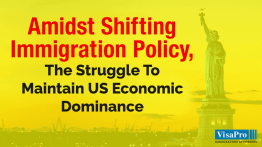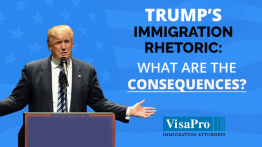Introduction
The United States has a long history of embracing the role of highly talented and motivated immigrants in building a strong economy. This principle has endured since the founding of the U.S. and has helped the country earn a reputation as one of the most technically innovative countries in the world. The numbers confirm that the ideology behind these pro immigrant policies is strong; according to a study by the Hatch Foundation, immigrants have started more than half of America’s startup companies with a net value in excess of $100 billion, and are key members of management or product development teams in over 70% (62 of 87) of such companies. Yet new anti-immigrant policies proposed by the Trump administration could throw off the immigrant driven talent pool that has sustained the American economy since the country’s birth.
Background:
Perhaps the most troubling of these policies for the U.S. economy is the “Buy American, Hire American” directive signed into law in 2017. The policy serves to limit the recruitment of foreign workers in favor of domestic workers and disproportionately affects highly skilled workers seeking out an H-1B Visa. This is particularly worrisome for U.S. technology companies, who rely heavily on an international pool of highly talented workers to make up for the insufficient numbers of highly educated STEM graduates from American universities. But as the H-1B Visa process becomes more and more uncertain, it is becoming difficult for these companies to recruit the workers that so desperately need.
H-1B denials have been steadily increasing since the inception of the policy, and requests for evidence to supplement these applications have nearly doubled in that same time frame. These bureaucratic hurdles have culminated in an average application processing time of five to seven months, a blow which any small, newer companies and startups cannot afford to cover. This severely limits the choice of these cutting-edge businesses and ultimately hurts the U.S. economy. Worse still, it excludes highly talented workers from contributing in the U.S. economy, often times pushing them into the arms of competing countries.
Wojichech’s U.S. Journey:
For one prospective U.S. immigrant, this struggle has become a source of daily anxiety. Wojichech, a chemistry PhD student interviewed by fwd.us, faces uncertainty regarding his legal status in the U.S. after he finishes his doctorate degree. Wojichech has proved an impressive student in his time in the U.S., where he conducts research on reducing the environmental impact of the chemical industry on the environment. While Wojichech is highly qualified and educated, there is no guarantee that he will be able to obtain an H-1B Visa, a critical step in qualifying for a green card and establishing his life in the United States. USCIS offers 85,000 of these visas annually, with 20,000 of these spots being reserved for students pursuing advanced degrees. The recent upsurge in denials has only increased the difficulty of this extremely competitive process. On account of these bureaucratic difficulties, the best bet for persons in Wojichech’s position is to seek out legal counsel. Fortunately for Wojichech, he recently accepted a position at a large company which connected him with an immigration attorney and covered his H-1B application expenses.

Dashed Dreams: The Story of Kunal Bahl
Not all applicants, however, are as lucky as Wojichech. At the time of his H-1B Visa application, Kunal Bahl, an Indian national, had obtained a business degree from the University of Pennsylvania and a position working at Microsoft. Kunal hoped to work for a few years at Microsoft and obtain experience and connections in the industry, ultimately starting up his own technology company in the United States. These dreams would never be recognized. In 2007, USCIS rejected Bahl’s application for an H-1B Visa. Luckily, Bahl’s ambition endured, and in 2010, he started the technology company that he dreamed of with his good friend in his home country of India. Since then, Bahl’s company- a tech startup called Snapdeal- has grown exponentially, reaching 50 million users and a net value of around $7 billion. Snapdeal is one of the most successful online retailers in India and competes with tech giants like Amazon. Bahl’s story is an excellent example of how exclusionary immigration policies only leads potential U.S. citizens to bring their lucrative talents elsewhere.
Conclusion
If you find yourself in the position of Bahl or Wojichech, it is important not to be discouraged. As Wojichech’s story indicates, there are legal avenues available for talented individuals to fight these oppressive policies. At VisaPro Law Firm, we are committed to ensuring that all qualified individuals obtain the right to work and thrive in the United States if they so desire. Contact VisaPro Immigration Lawyers Today and learn how to minimize H-1B denials. We will go over every detail of your case and craft a customized immigration strategy for you to realize your dreams of permanent residency in the United States.
What VisaPro Customers Are Saying
[VisaPro legal team] was incredibly knowledgable and extremely helpful throughout the process. We were exceptionally impressed with how they have combined the great personal and communication skills they bring and also technology with a highly intuitive website which guides you and keeps you updated throughout the process……..This is a true testimonial, I would highly recommend VisaPro to anyone looking for guidance and success in this area."
 Paul Lyons, President, Atlas Intelligence Inc
Paul Lyons, President, Atlas Intelligence Inc



